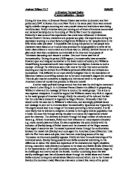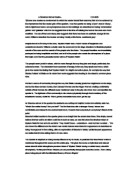That is not to say that Williams presents a situation that is either positive or, more crucially, hopeful. Instead, he examines twentieth century society as a great evolutionary mechanism: a fact, an absolute, in which Blanche constitutes an anomaly. Within this mechanism, base-line motivations act as stimuli for every moment of character action—and, as a reader, there is a temptation to focus on this. However, a more consequential realisation is that these hedonistic human pursuits—sex, monetary accumulation, power, and so on—also power the stasis of the play. Every moment of internal equilibrium is clamped in place by microcosm of personal economics and raw desire.
The best illustrations of this come through Stella. Of course, her behaviour is often contrasted in blunt and unequal terms to Blanche’s melodrama. As a result of this, the passages between them exhibit a rather distorted sense of tension, whereby Stella’s consistency of view-point deflates the very conflict that Blanche is starting. Therefore, there is a tendency, particularly early in the play, to see Stella as a defeated character: there is aura of disconnection about her, as if the world has no effect on her:
Blanche: And you are standing there smiling.
Stella: What do you want me to do?
B: Pull yourself together and face the facts.
S: What are they, in your opinion?
B: In my opinion? You’re married to a madman!
S: No!
B: Yes, you are, your fix is worse than mine is! Only you’re not being sensible about it. I’m going to do something. Get a hold of myself and make myself a new life!
S: Yes?
B: But you’ve given in. And that isn’t right, you’re not old! You can get out.
S: (slowly and emphatically) I’m not in anything I want to get out of.
Stella’s passivity towards Blanche’s protestations is a product of this animalistic self-preservation; she is not accepting a nasty, unsolvable problem, but rather endorsing the life she leads.
This point is further emphasised in her persistent allegiance to Stanley. While it is very difficult to come to a conclusion about the extent of Stella’s affection for Stanley, this is not necessarily important. What is crucial, rather, is the extent to which she can be critical of him. Does she have the potential to negatively judge him, and form an opinion that extends beyond what is practical? There is no evidence of this at all. We see this absence most notably in the last scene of the play, when she fails to question Stanley’s claims about Blanche. Indeed, at the very end of the play Stella shows, in her pain, that the “new world” is not just her fate, but her choice. Even in the utter agony of having her sister committed, she returns submissively to Stanley.
The patterns of primal behaviour which transcend the play—most specifically, Stanley’s emotional and physical conquering of Blanche—are actually the structure in which the characters live. Any judgement Williams gives about this existence abstains from commenting on how effective this is for its participants. There is very little to suggest an inherent dissatisfaction in the lives of Stella and Stanley. It is therefore rather crude to suggest that the play presents anything of a “broken world”—at the very least, in the sense that ‘broken’ implies a self-contained dysfunction.
What, then, is the judgement on this hedonistic world, referred to above? That really comes down to is a judgement about Blanche; at least, the two are highly dependant.
In the end, it seems rather superficial to argue that Streetcar judges the modern world as a broken one. Some might claim that Stanley’s realism and forcefulness is shown to be somehow immoral. The fact that Blanche suffocates within the commune is just as much a comment on her as it is on the behaviour of the other characters. The existentialist movement rose alongside science and a more reasoned age, so could it not be argued that Blanche is simply defective amidst a world that is superior to her own hopes? Indeed, she is unable to reconcile her spiritual pretensions internally, let alone make them function within the modern world. Stanley’s findings about her past sexual experiences are more than just a victory; they show a flaw which is even greater than naivety. Yes, they show both hypocrisy and a contradiction that extends even to the point of schizophrenia.
One can only surmise that the world is broken through Blanche’s eyes. However, this is a rather different conclusion to reach. Through her eyes, there is a conflict between what she wants the world to be—the idealistic, indefinable purpose she’s searching for—and the reality that everyone else accepts. The world, we see, is broken only to the degree that it is defined as something higher.







